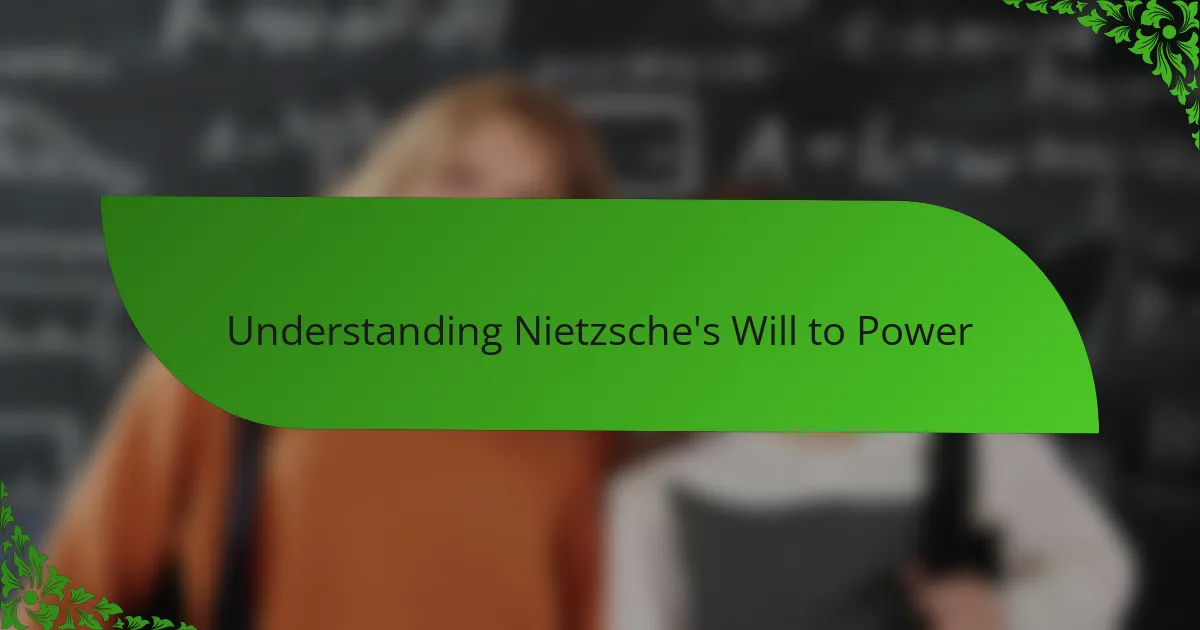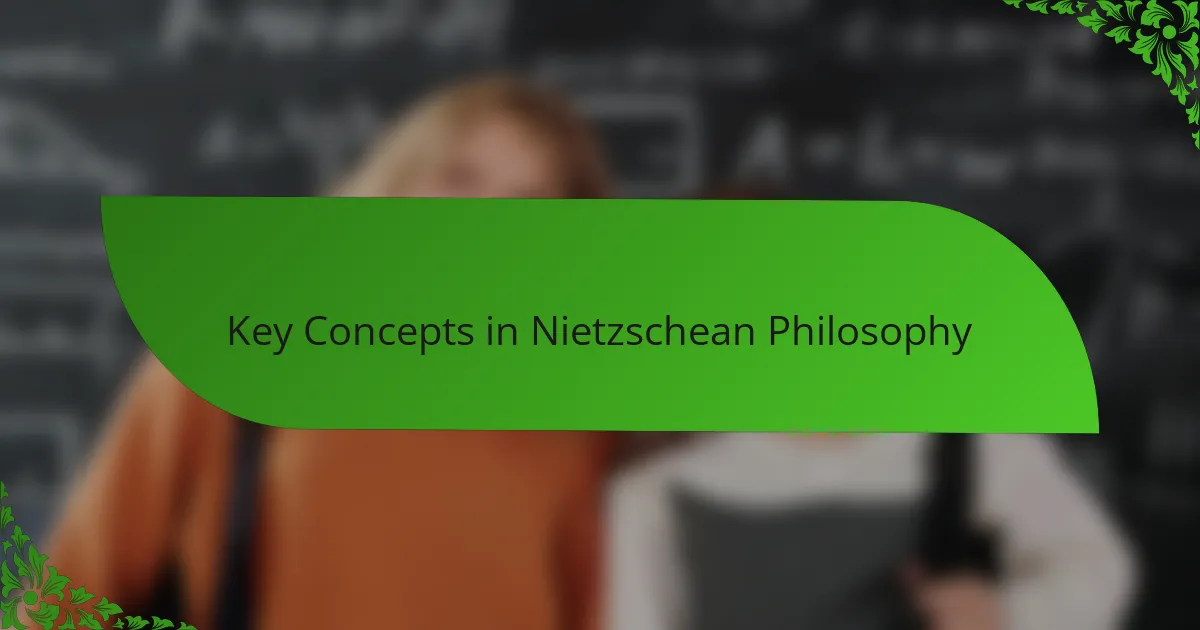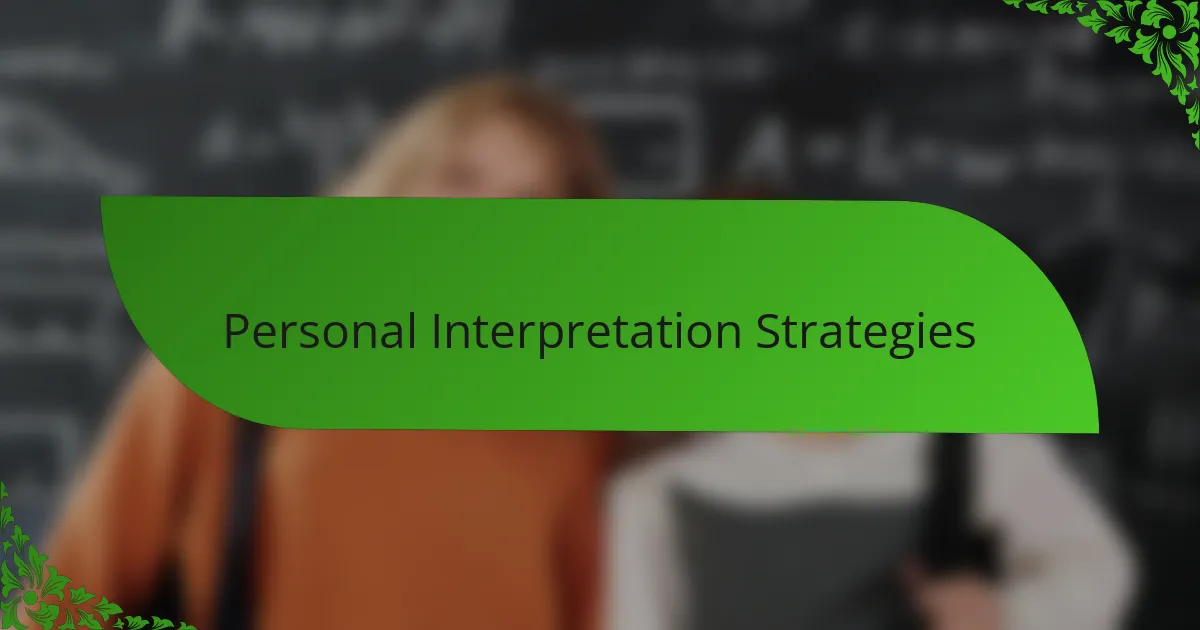Key takeaways
- The Will to Power is a driving force behind creativity and personal growth, encouraging individuals to overcome challenges and redefine their values.
- Nietzsche’s concepts of perspectivism and the critique of traditional morality challenge individuals to examine their beliefs and strive for authenticity.
- Incorporating the Will to Power in education fosters critical thinking and promotes personal development through embracing struggle and uncertainty.
- Applying Nietzsche’s ideas practically can transform one’s approach to challenges, viewing them as opportunities for self-overcoming and intentional living.

Understanding Nietzsche’s Will to Power
When I first encountered Nietzsche’s concept of the Will to Power, I was struck by its intensity and complexity. It felt less like a straightforward theory and more like a profound invitation to rethink what drives human behavior beyond just survival or pleasure. Have you ever wondered what truly motivates people at their core?
For me, the Will to Power isn’t just about domination or control, as it’s sometimes misunderstood. It’s about the fundamental force behind creativity, growth, and the pursuit of one’s potential—even in the face of adversity. This idea resonated deeply because it reminded me of moments when I pushed myself beyond limits, driven by an internal urge to overcome and become more than I was.
In practical terms, understanding the Will to Power means appreciating that life is a dynamic struggle where values and meaning are constantly created and redefined. Nietzsche challenges us to embrace this struggle rather than shy away from it, prompting me to ask: how can I harness this inner drive to live more authentically and powerfully?

Key Concepts in Nietzschean Philosophy
One of the key concepts that stood out to me in Nietzschean philosophy is the idea of perspectivism. Nietzsche suggests that there are no absolute truths, only interpretations shaped by our unique perspectives. This was eye-opening because it challenges the way I used to think about knowledge—as something fixed and objective. Have you considered how your own views might be limited by your personal experiences and biases?
Another concept that I find intriguing is the critique of traditional morality. Nietzsche doesn’t simply reject morality; he exposes how many moral systems suppress individual creativity and vitality. Reflecting on this made me question which values I truly own and which ones I’ve just absorbed from society without much thought.
Finally, Nietzsche’s notion of the Übermensch—the “overman” or “beyond-man”—speaks directly to the Will to Power. It represents the ideal of someone who creates their own values and meaning, rising above conventional norms. When I think of this, I feel both challenged and inspired, wondering what steps I could take to become more self-determined in my own life.

Will to Power in Philosophy Education
Philosophy education often emphasizes critical thinking, but the Will to Power adds a new dimension—encouraging students to actively shape their intellectual and personal growth. I remember when I introduced this concept in a seminar, noticing how it sparked deeper questions about motivation and ambition beyond typical academic goals. Doesn’t learning become more vibrant when we see ourselves not just as passive recipients but as creators of knowledge and values?
In my experience, incorporating Nietzsche’s Will to Power in philosophy classes helps students confront discomfort and uncertainty. Instead of seeking easy answers, they learn to embrace struggle as an essential part of intellectual development—a process that reflects the very core of Nietzsche’s idea. How often do we encourage learners to see challenges as opportunities to redefine who they are, rather than obstacles to avoid?
Bringing the Will to Power into educational settings also invites reflection on personal purpose and authenticity. Watching students wrestle with these themes reminds me that philosophy isn’t just theoretical—it touches the lived experience. It makes me wonder: can education itself become a practice of self-overcoming and transformation, in tune with Nietzsche’s vision?

Applying Nietzsche’s Ideas Practically
Applying Nietzsche’s Will to Power practically has transformed how I approach challenges in my daily life. Instead of seeing obstacles as threats, I began to view them as opportunities to assert my creative energy and redefine what I value. Have you ever noticed how this shift changes not just your mindset, but also the outcomes you produce?
One time, I deliberately chose a difficult project that others avoided, not out of stubbornness but because I wanted to test my limits and grow stronger. That experience taught me that embracing struggle is essential—not something to escape, but something that fuels personal development. Isn’t it fascinating how surrendering to this internal drive can lead to unexpected achievements?
In small ways, I try to cultivate practices that honor my Will to Power—whether it’s setting ambitious goals, questioning inherited beliefs, or simply pushing myself to learn new skills. These actions feel like daily acts of creation, a way to live intentionally rather than passively. How might you apply this dynamic energy to reshape your own path?

Personal Interpretation Strategies
When interpreting Nietzsche’s Will to Power, I found that anchoring my understanding in lived experience made the concept less abstract. For instance, reflecting on moments when I felt a surge to overcome setbacks helped me see Will to Power as an active force, not just an idea. How often do we pause to recognize these internal pushes as expressions of something profound within us?
I also rely heavily on questioning my initial instincts and assumptions—this aligns well with Nietzsche’s call to challenge inherited values. By writing down conflicting thoughts or journaling my reactions to philosophical texts, I create a dialogue with Nietzsche’s ideas rather than just passively consuming them. This practice deepens my engagement and reveals nuances I might have missed otherwise.
Sometimes, I visualize Will to Power as an evolving narrative in my life, rather than a fixed doctrine. This outlook invites me to reinterpret events—failures become chapters of growth, and choices reflect a creative will rather than mere compliance. Do you find that storytelling your own experience helps ground abstract philosophy in reality? For me, it’s been a surprisingly effective strategy.

Reflecting on Will to Power in Life
Reflecting on the Will to Power in life often feels like tuning into a quiet yet persistent voice inside—one that urges me to grow, create, and transform even when circumstances seem discouraging. I’ve noticed that embracing this drive doesn’t always mean triumph in the conventional sense; sometimes it’s about finding courage in vulnerability and authenticity. Have you ever felt such an inner tug, pushing you beyond comfort into new possibilities?
There are moments when the Will to Power reveals itself in subtle ways—through small acts of choosing honesty over convenience, or daring to voice an unpopular opinion. These instances remind me that power isn’t just about dominance but about self-realization and the ongoing dance with one’s limitations. How might your own life reflect this continuous becoming rather than static being?
At times, I grapple with the tension between striving and acceptance, wondering if the Will to Power calls for relentless striving or a wise surrender to life’s flow. Yet, I’ve come to see that this concept is less about rigid goals and more about an energetic engagement with existence itself—an invitation to live fully, creatively, and unapologetically. Could embracing this dynamic spark offer a deeper sense of meaning in your daily experience?